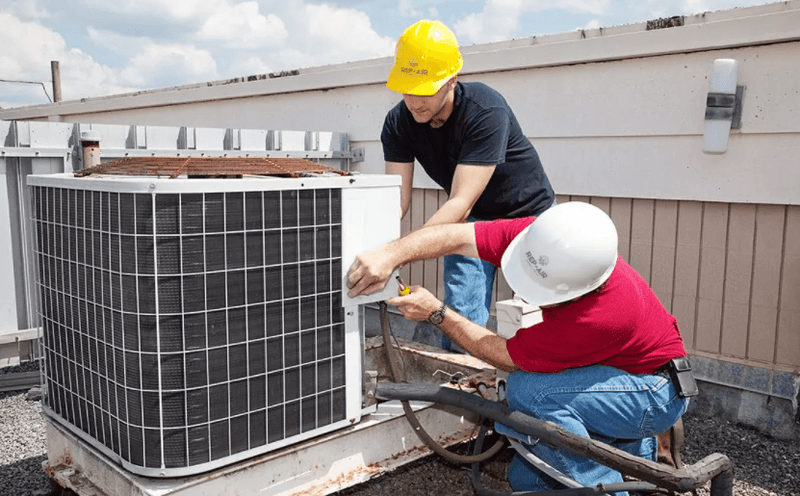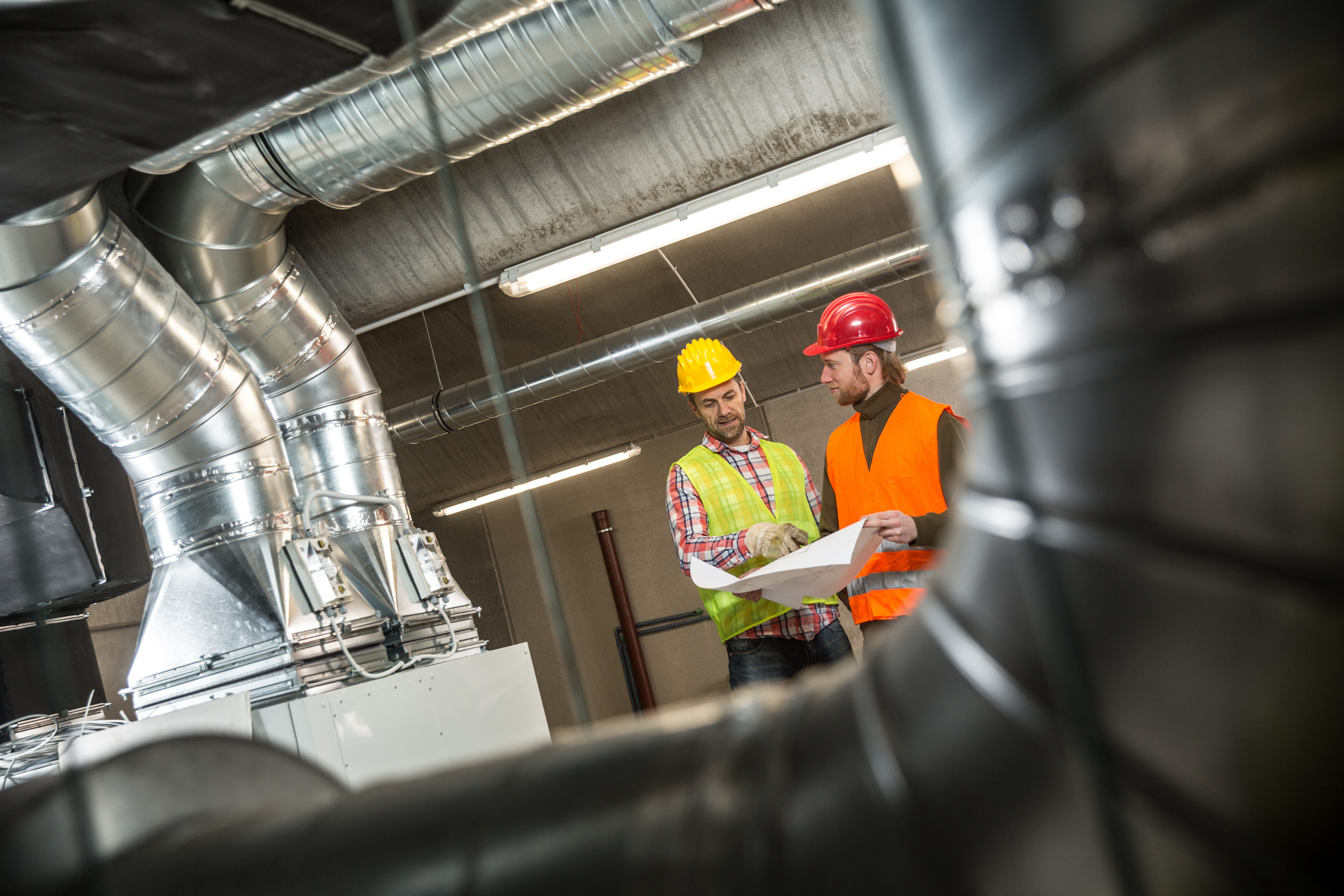Discovering the Essential Elements of an Efficient Cooling And Heating System
An effective heating and cooling system is improved a number of vital components that work in harmony. Each part, from the thermostat to the ductwork, plays a crucial role in maintaining comfort and power performance. Recognizing these components is essential for maximizing efficiency and boosting interior air top quality. As one checks out these parts, the complex relationships between them expose insights right into improving general system efficiency. What specific elements contribute most to this performance?
The Function of the Thermostat in Heating And Cooling Performance

Although typically overlooked, the thermostat plays an important duty in the effectiveness of HVAC systems. HVAC experts. This little gadget works as the primary control center, controling temperature setups and making sure excellent convenience within a space. By properly picking up the ambient temperature level, the thermostat interacts with the air flow, air, and home heating conditioning units to preserve the desired climate
An efficient thermostat reduces energy usage by turning on the cooling and heating system only when required, therefore preventing extreme home heating or air conditioning. Modern programmable and clever thermostats enhance this performance better by allowing customers to set routines and from another location readjust setups, adapting to day-to-day regimens.
The placement of the thermostat is vital; improper place can lead to inaccurate temperature level analyses, resulting in ineffective procedure. On the whole, a well-functioning thermostat not only enhances convenience however also contributes considerably to energy financial savings and the long life of the a/c system.
Understanding the Value of Air Filters
Air filters serve an essential function in HVAC systems by ensuring that the air flowing within an area remains healthy and clean. These filters trap dust, irritants, and various other pollutants, avoiding them from being recirculated throughout the atmosphere. By recording these particles, air filters add to enhanced interior air quality, which can greatly benefit residents' health and wellness, especially those with allergic reactions or respiratory conditions.
Additionally, keeping clean air filters enhances the effectiveness of heating and cooling systems. Clogged up filters can limit airflow, creating the system to function tougher to preserve desired temperatures, resulting in enhanced energy intake and higher utility expenses. Consistently replacing or cleaning filters is a vital maintenance action that can prolong the lifespan of HVAC tools. Inevitably, comprehending the significance of air filters allows home owners and structure supervisors to take positive procedures to assure a well-functioning, effective heating and cooling system that advertises a risk-free and comfy indoor atmosphere.

The Performance of the Heater and Heat Pump
Heaters and heatpump are important components of HVAC systems, in charge of offering warmth throughout colder months. Furnaces run by heating air through burning or electrical resistance, then distributing it throughout the home through ducts. They generally supply rapid home heating and can be sustained by all-natural gas, electricity, or oil, relying on the system kind.
Alternatively, warmth pumps move warmth as opposed to generate it. They remove warm from the outside air or ground, even in reduced temperatures, and transfer it indoors. HVAC experts. This dual functionality enables heatpump to also offer air conditioning in warmer months, making them flexible alternatives for year-round environment control
Both systems require correct maintenance to ensure performance and durability. While furnaces excel in extreme cool, heatpump can be helpful in modest climates. Comprehending their unique performances aids homeowners in choosing the most suitable choice for their heating requires.
Discovering the Air Conditioning Device
The cooling device is an important component of HVAC systems, offered in various types to suit different needs. Comprehending the effectiveness rankings of these units is necessary for making educated selections regarding power intake and expense. This section will check out the diverse types of air conditioners and clarify exactly how efficiency scores effect efficiency.
Kinds Of Air Conditioners
While various elements influence the option of cooling systems, comprehending the various kinds readily available is critical for homeowners and building managers alike. Central air conditioners are created to cool entire homes or buildings, using a network of air ducts for air movement. Home window systems use a more localized remedy, perfect for little areas or solitary spaces. Portable air conditioners offer versatility, permitting individuals to this website move the unit as needed. Ductless mini-split systems are another option, combining the efficiency of central systems with the benefit of zoning, as they require no ductwork. Lastly, geothermal systems harness the earth's temperature for energy-efficient cooling. Each kind features distinct benefits, making educated selections vital for efficient climate control.

Performance Ratings Described
Understanding performance scores is vital for selecting the best cooling system, as these metrics supply understanding right into the system's performance and energy consumption. One of the most usual score for air conditioners is the Seasonal Energy Efficiency Ratio (SEER), which determines the cooling output during a regular air conditioning season separated by the complete electrical energy input. A greater SEER indicates far better effectiveness. Additionally, the Power Performance Ratio (EER) is used for measuring effectiveness under particular problems. An additional essential metric is the Power Star accreditation, which represents that an unit satisfies strict energy performance standards. By assessing these scores, customers can make informed selections that not just enhance convenience yet also lower power costs and environmental influence.
The Significance of Ductwork and Air movement
Reliable ductwork design and air flow management play vital functions in the general efficiency and performance of cooling and heating systems. Appropriate ductwork warranties that conditioned air is dispersed uniformly throughout a room, lessening temperature variations and Full Report boosting convenience. Properly designed air ducts reduce resistance to air flow, minimizing the workload on heating and cooling tools and inevitably reducing energy usage.
Air flow management involves strategically positioning vents and registers to enhance the flow of air. This stops common issues such as cold or hot areas, which can take place when air movement is blocked or improperly balanced. Furthermore, the ideal duct products and insulation can better boost performance by reducing warmth loss or gain during air transit.
An effective ductwork system not only adds to energy savings yet can likewise extend the life expectancy of a/c equipment by reducing unnecessary strain (HVAC experts). Subsequently, comprehending the significance of ductwork and airflow is vital for achieving peak heating and cooling system performance
Routine Maintenance Practices to Enhance Efficiency
Routine maintenance practices are essential for ensuring peak efficiency of cooling and heating systems. These techniques consist of routine assessments, cleansing, and necessary repair work to maintain the system running effectively. Routinely changing air filters is important, as blocked filters can obstruct air flow and minimize performance. Furthermore, service technicians should inspect and tidy evaporator and condenser coils to avoid overheating and energy wastefulness.
Annual expert evaluations are also suggested, as qualified professionals can recognize potential concerns prior to they rise. Lubing relocating parts reduces damage, contributing to a longer life expectancy for the system. Ensuring that the thermostat operates appropriately aids in keeping perfect temperature level control.
Frequently Asked Concerns
Just how Often Should I Change My Thermostat?
Thermostats need to usually be changed every 5 to one decade, depending upon usage and technology improvements. Normal checks are a good idea to assure peak performance, especially if experiencing inconsistent temperature level control or you can try these out boosted power expenses.
What Size Air Filter Is Finest for My Cooling And Heating System?
The very best size air filter for a cooling and heating system differs by unit design. Commonly, it's vital to get in touch with the owner's handbook or examine the existing filter measurements to assure peak performance and air high quality.
Can I Install a Warm Pump Myself?
Mounting a heatpump individually is possible for experienced individuals, but it needs knowledge of neighborhood codes and electric systems. Working with an expert is suggested to guarantee correct installment and perfect system efficiency.
How Do I Know if My Ductwork Is Efficient?
To identify ductwork performance, one should inspect for leakages, action air movement at vents, inspect insulation high quality, and assess temperature distinctions between supply and return ducts. Expert evaluations can provide extensive insights right into total efficiency.
What Are Signs My Heating And Cooling Needs Immediate Upkeep?
Signs that a HVAC system needs prompt maintenance consist of unusual noises, irregular temperatures, increased energy bills, undesirable odors, and regular cycling. Attending to these concerns promptly can protect against further damage and warranty optimal system efficiency.
Air filters offer a necessary feature in Cooling and heating systems by assuring that the air distributing within a space stays clean and healthy. Additionally, maintaining tidy air filters enhances the efficiency of HVAC systems. Ductless mini-split systems are an additional choice, incorporating the efficiency of main systems with the ease of zoning, as they call for no ductwork. Recognizing performance scores is vital for picking the best air conditioning device, as these metrics offer insight into the system's performance and energy usage. The best size air filter for a HVAC system differs by unit layout.